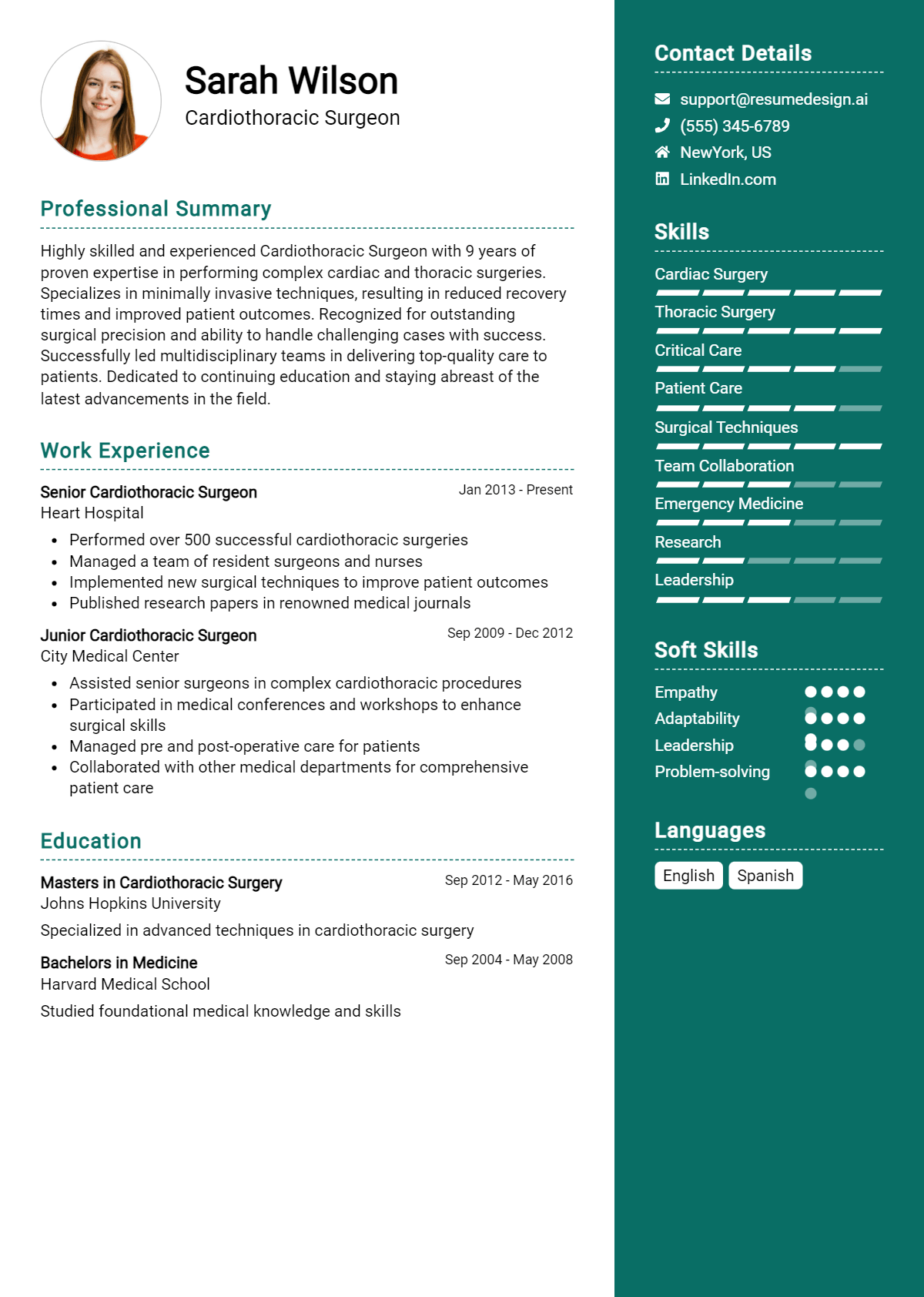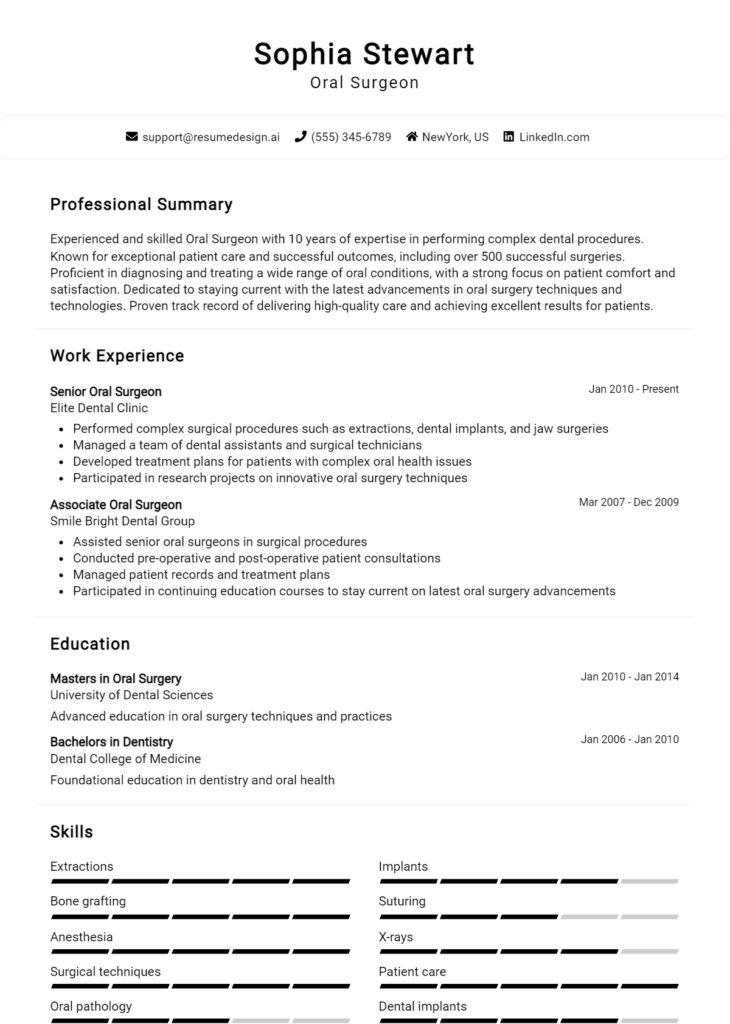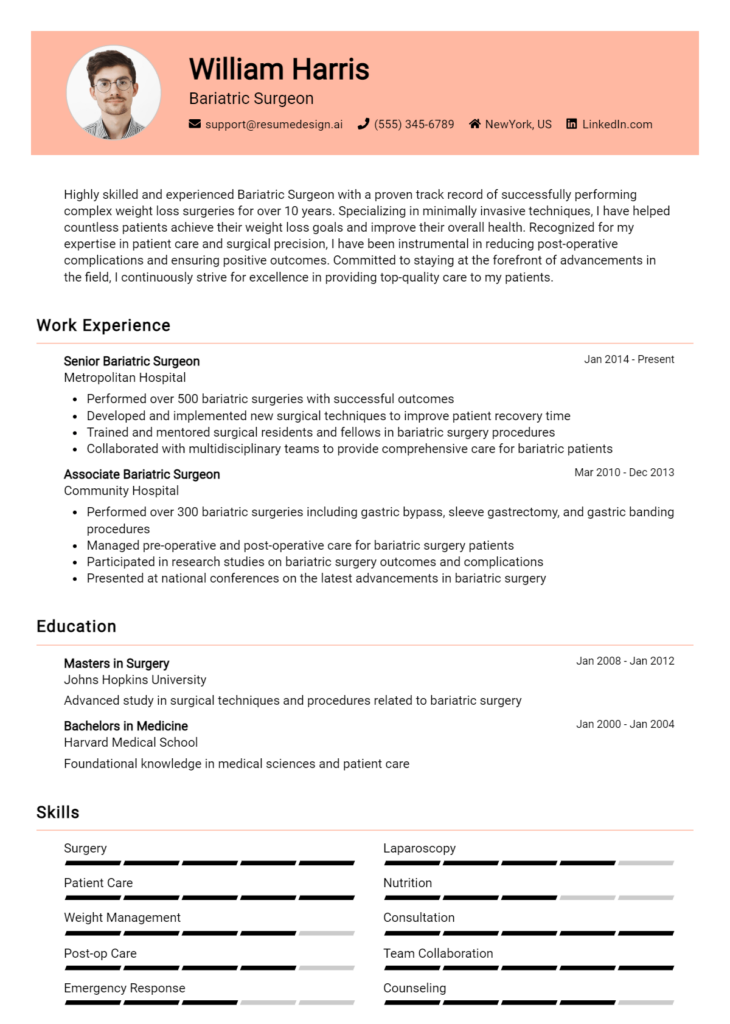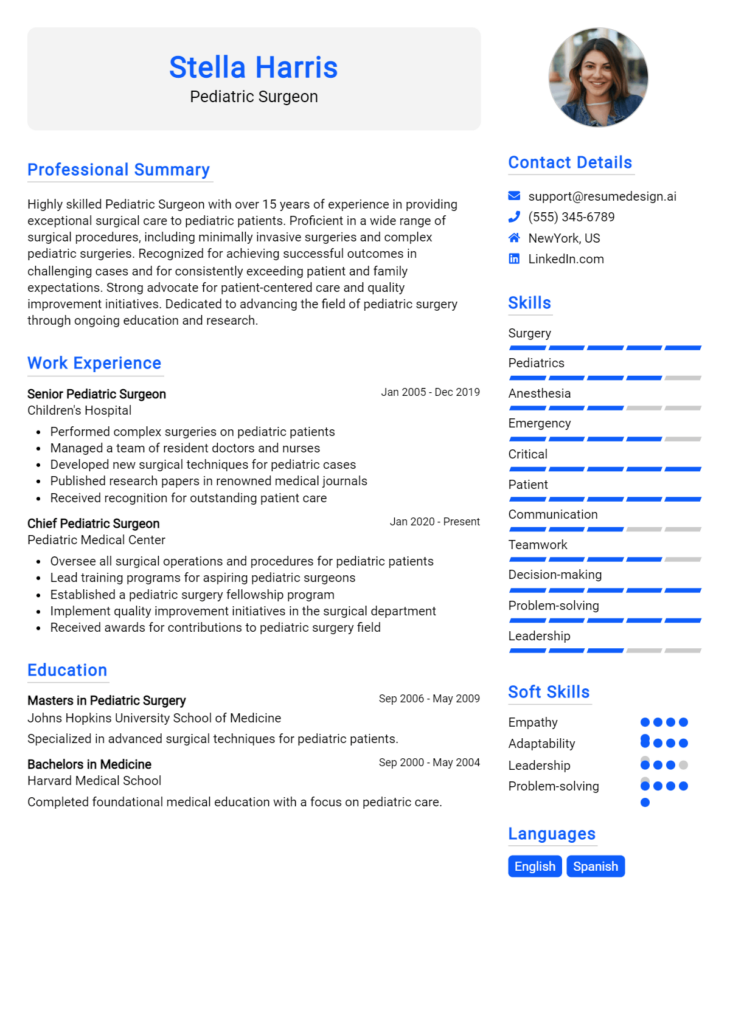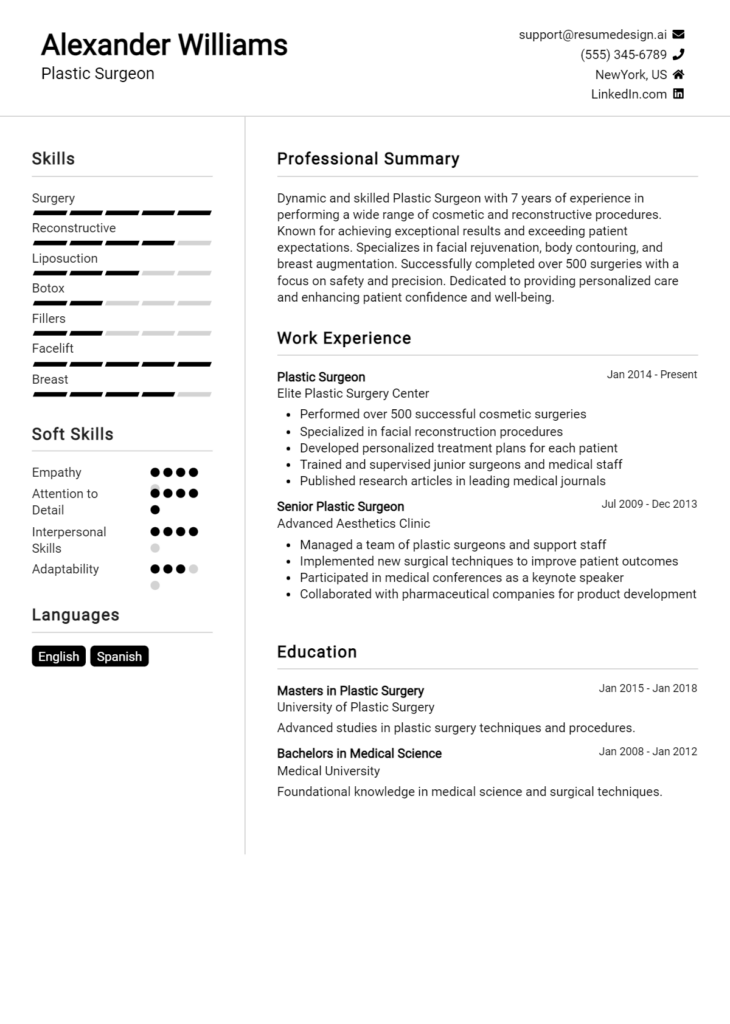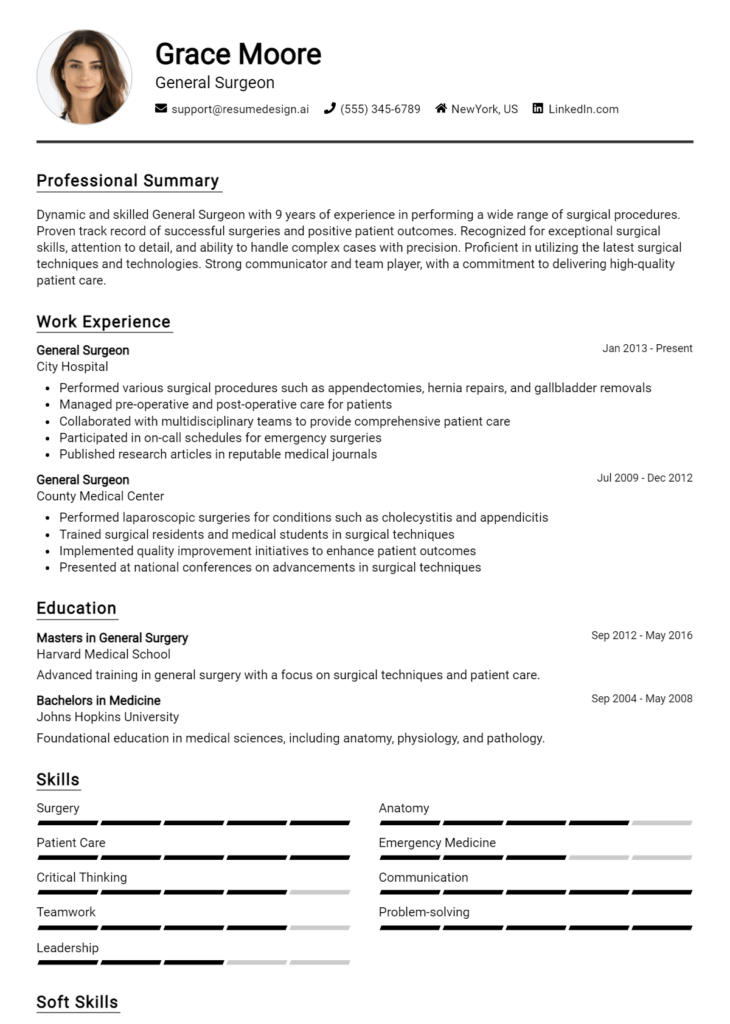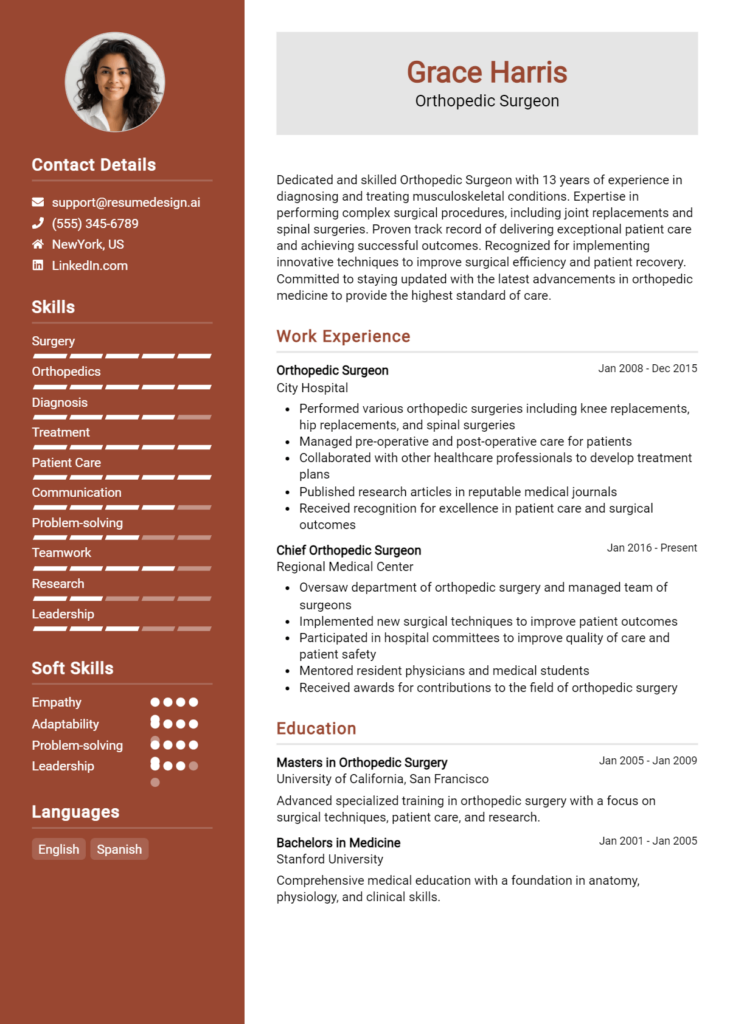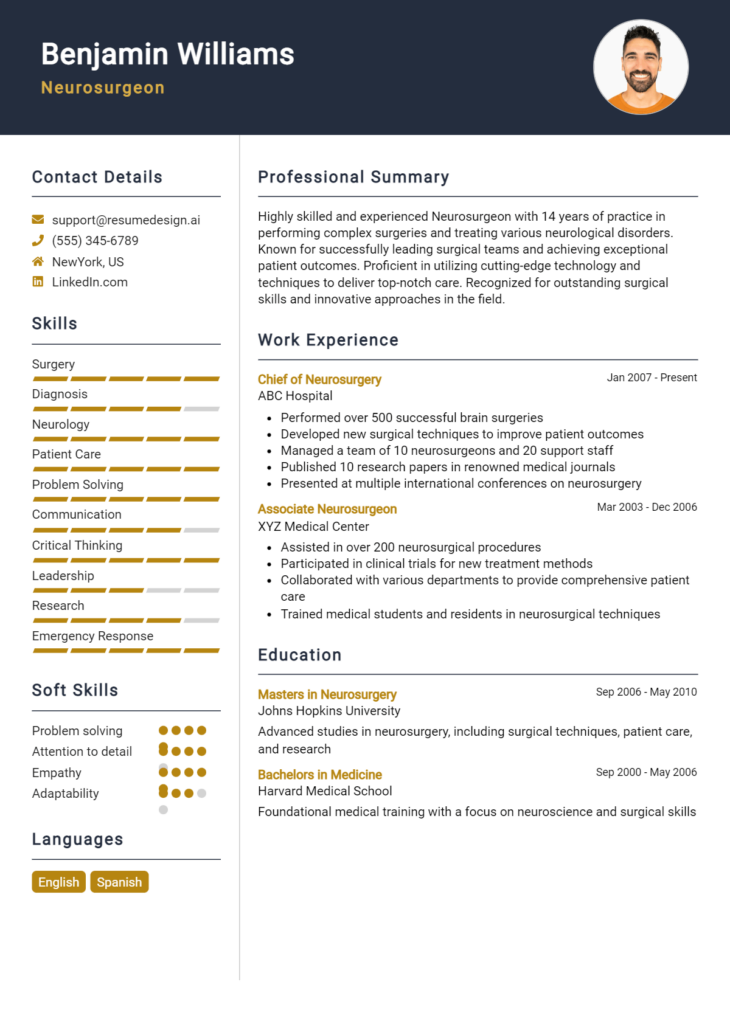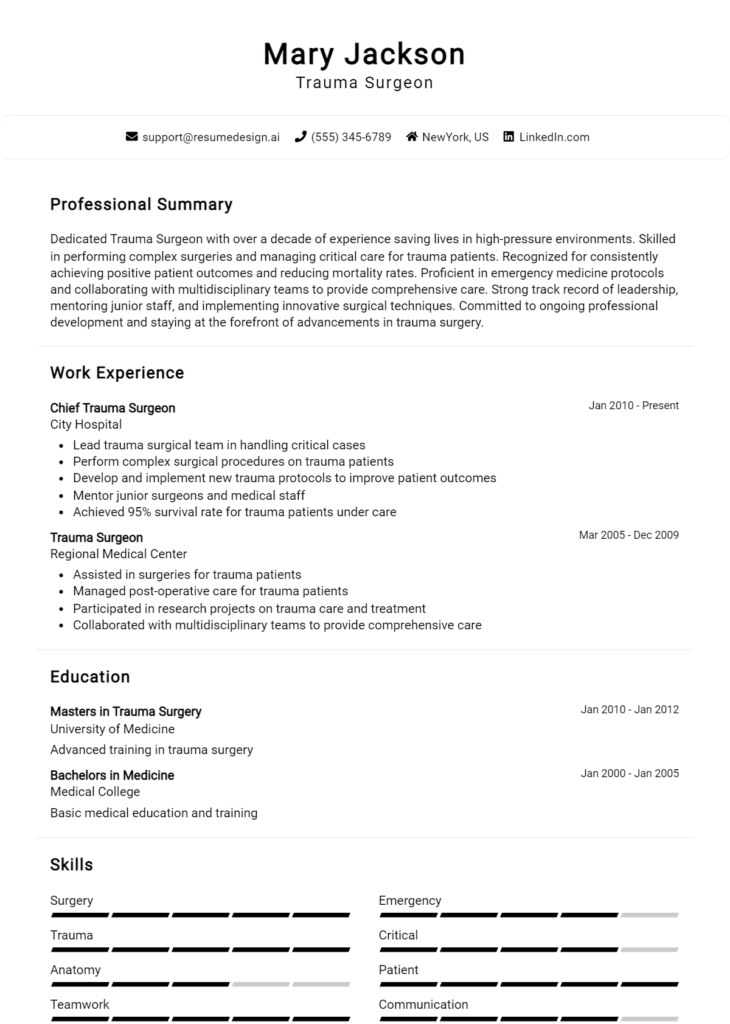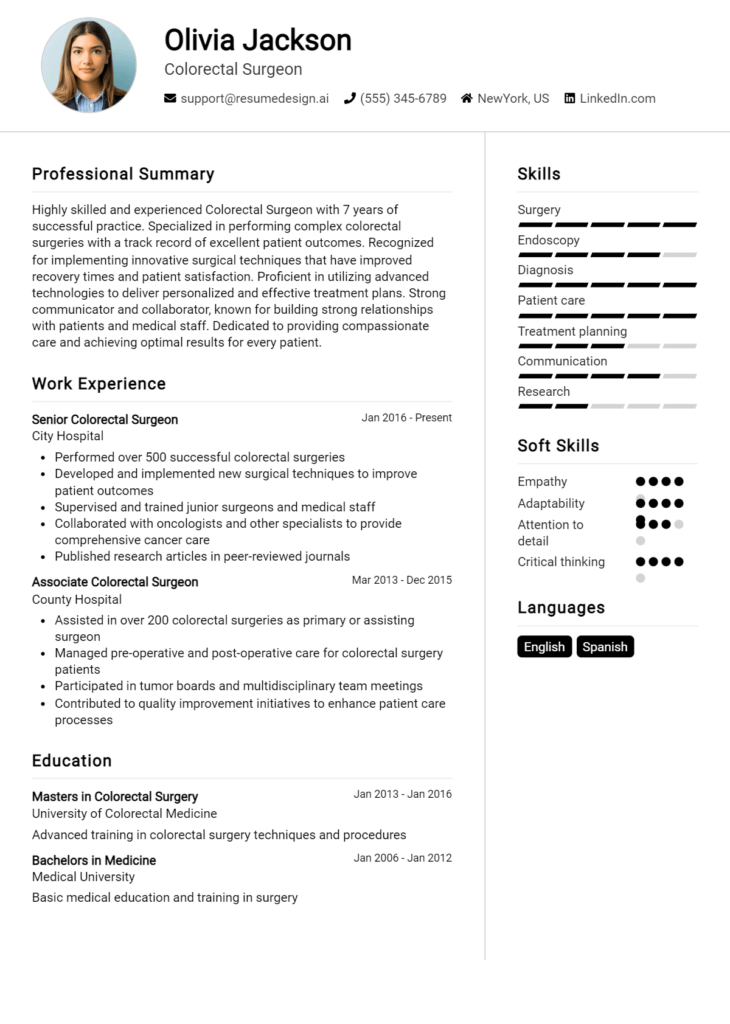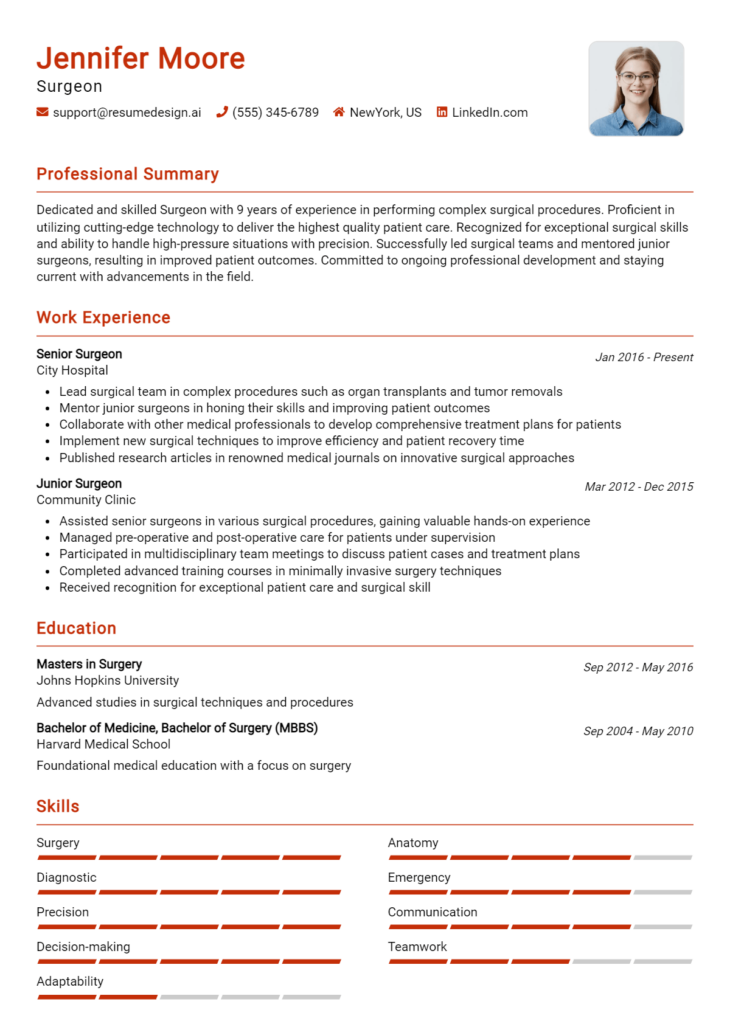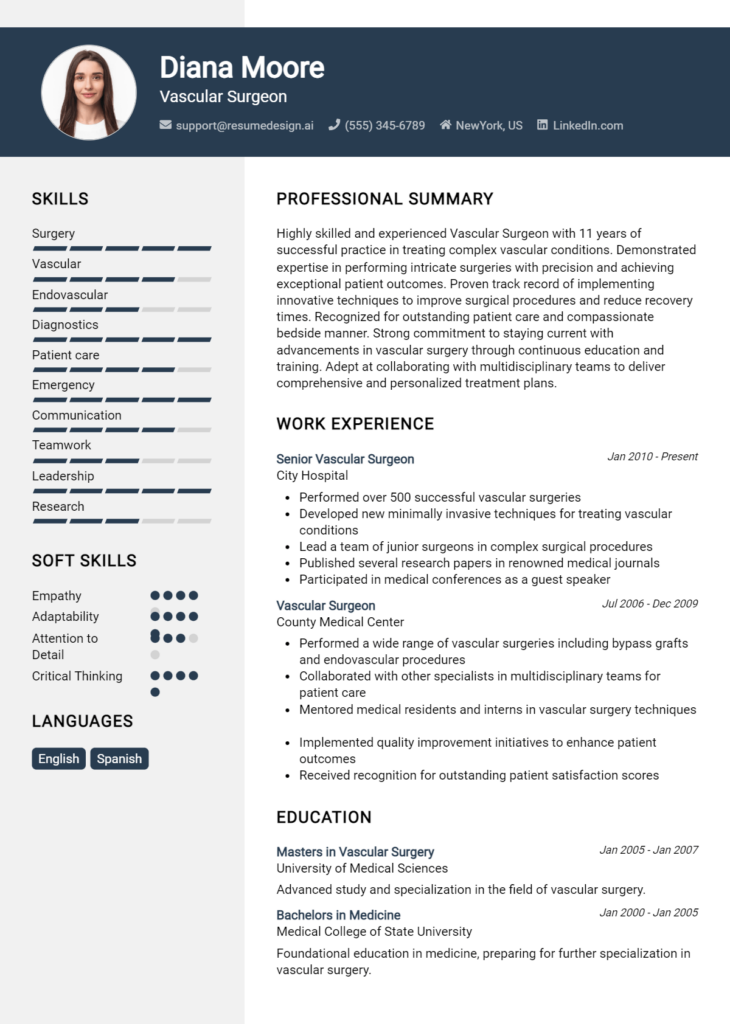Cardiothoracic Surgeon Core Responsibilities
A Cardiothoracic Surgeon plays a critical role in diagnosing and treating conditions related to the heart and lungs, requiring a blend of technical expertise, operational management, and advanced problem-solving skills. They collaborate with various departments, including cardiology, radiology, and nursing, ensuring comprehensive patient care. Mastery of surgical techniques, critical thinking, and effective communication are essential for success, directly contributing to the organization’s goals of improving patient outcomes. A well-structured resume can effectively highlight these core competencies.
Common Responsibilities Listed on Cardiothoracic Surgeon Resume
- Performing complex surgical procedures on the heart, lungs, and other thoracic organs.
- Conducting pre-operative assessments and developing surgical plans.
- Collaborating with multidisciplinary teams for comprehensive patient care.
- Monitoring patients' post-operative recovery and managing complications.
- Utilizing advanced imaging technology for accurate diagnosis.
- Educating patients and families about surgical procedures and recovery.
- Staying updated on advancements in cardiothoracic surgical techniques.
- Participating in surgical research and clinical trials.
- Maintaining accurate medical records and documentation.
- Adhering to safety and quality standards in surgical practices.
- Providing mentorship and guidance to junior surgical staff.
- Engaging in community outreach and health education programs.
High-Level Resume Tips for Cardiothoracic Surgeon Professionals
In the competitive field of cardiothoracic surgery, a well-crafted resume is not just a document; it’s a vital tool that can open doors to new opportunities. For professionals in this specialized area, the resume often serves as the first impression made on potential employers, making it crucial to reflect not only essential skills but also notable achievements and experiences. A strong resume can effectively communicate a candidate's qualifications, dedication, and expertise to hiring committees, thus setting the stage for further discussions. This guide will provide practical and actionable resume tips specifically tailored for cardiothoracic surgeon professionals to enhance their job applications.
Top Resume Tips for Cardiothoracic Surgeon Professionals
- Customize your resume for each job application by incorporating keywords from the job description to demonstrate alignment with the employer's needs.
- Highlight relevant clinical experience, including specific procedures performed, to showcase your hands-on expertise and proficiency in cardiothoracic surgery.
- Quantify your achievements, such as the number of successful surgeries completed or improvements in patient outcomes, to provide concrete evidence of your capabilities.
- Include certifications, fellowships, and continuing education to demonstrate your commitment to professional development and staying current in the field.
- Showcase leadership roles in multidisciplinary teams or surgical departments to illustrate your ability to collaborate and lead in high-stakes environments.
- Detail any research contributions, publications, or presentations at conferences that underscore your involvement in advancing the field.
- Employ a clean and professional format that ensures readability, allowing your qualifications to stand out without distractions.
- Utilize a strong summary statement at the top of your resume that encapsulates your expertise, skills, and career objectives, engaging the reader from the start.
- Include relevant technical skills, such as proficiency in advanced surgical techniques or familiarity with cutting-edge medical technology, to demonstrate your comprehensive knowledge base.
By implementing these tips, cardiothoracic surgeon professionals can significantly enhance their resumes, increasing the chances of landing a job in this highly specialized and sought-after field. A strong resume not only showcases qualifications but also conveys passion and commitment, making candidates more appealing to potential employers.
Why Resume Headlines & Titles are Important for Cardiothoracic Surgeon
In the competitive field of cardiothoracic surgery, a well-crafted resume headline or title is crucial for standing out among numerous qualified candidates. A strong headline can immediately capture the attention of hiring managers, offering a succinct summary of a candidate’s key qualifications and professional identity. It serves as a powerful first impression, highlighting the most relevant skills, experiences, or achievements that align with the job being applied for. A concise, relevant, and targeted headline not only enhances the resume’s effectiveness but also sets the tone for the rest of the application, making it essential for aspiring cardiothoracic surgeons to invest time in creating impactful titles.
Best Practices for Crafting Resume Headlines for Cardiothoracic Surgeon
- Keep it concise: Aim for a headline that is brief yet informative, ideally no more than 10-12 words.
- Be role-specific: Tailor your headline to reflect the specific position you are applying for, using relevant terminology.
- Highlight key strengths: Incorporate your most impressive skills or accomplishments that are pertinent to the role.
- Use active language: Choose powerful action words that convey confidence and expertise.
- Avoid jargon: Ensure that your headline can be easily understood by individuals outside your specialty.
- Make it visually appealing: Use capitalization for key words to enhance readability.
- Include certifications or credentials: If applicable, mention any relevant certifications that bolster your qualifications.
- Revise for clarity: Ensure that your headline communicates your value proposition clearly and effectively.
Example Resume Headlines for Cardiothoracic Surgeon
Strong Resume Headlines
Board-Certified Cardiothoracic Surgeon with 15 Years of Experience in Complex Procedures
Dedicated Cardiothoracic Surgeon Specializing in Minimally Invasive Techniques
Experienced Cardiothoracic Surgeon Committed to Advancing Patient Care Through Innovative Solutions
Weak Resume Headlines
Surgeon Looking for Opportunities
Medical Professional with Experience
The strong resume headlines are effective because they are specific, highlighting the candidate's qualifications and area of expertise, making them more relevant to the hiring manager. In contrast, the weak headlines fail to impress due to their vagueness and lack of detail, providing no clear indication of the candidate's skills or professional identity. By focusing on the strengths and specific qualifications, strong headlines create a compelling narrative that encourages further exploration of the resume.
Writing an Exceptional Cardiothoracic Surgeon Resume Summary
A well-crafted resume summary is essential for a Cardiothoracic Surgeon, as it serves as the first impression to hiring managers. This brief yet impactful paragraph captures the candidate's key skills, extensive experience, and significant accomplishments within the field, effectively setting the tone for the rest of the resume. A strong summary not only highlights relevant qualifications but also demonstrates an understanding of the specific requirements of the job being applied for. By being concise and tailored, candidates can quickly engage the reader's interest and make a compelling case for their candidacy.
Best Practices for Writing a Cardiothoracic Surgeon Resume Summary
- Quantify achievements: Use numbers to highlight the impact of your work, such as the number of surgeries performed or patient outcomes.
- Focus on skills: Emphasize technical skills, such as proficiency in minimally invasive techniques or advanced surgical procedures.
- Tailor the summary: Customize the summary to align with the specific job description, incorporating relevant keywords and requirements.
- Highlight certifications and education: Mention board certifications and advanced degrees that are pertinent to the role.
- Showcase leadership experience: If applicable, include roles that demonstrate your ability to lead surgical teams or mentor other surgeons.
- Keep it concise: Aim for 3-5 sentences that encapsulate your professional identity without overwhelming the reader.
- Use action verbs: Begin sentences with strong action verbs to convey confidence and initiative.
- Maintain professionalism: Use a formal tone and avoid overly casual language to reflect the seriousness of the profession.
Example Cardiothoracic Surgeon Resume Summaries
Strong Resume Summaries
Dedicated Cardiothoracic Surgeon with over 10 years of experience in performing complex cardiac surgeries. Successfully completed over 500 procedures with a 95% patient recovery rate, specializing in minimally invasive techniques. Board-certified and committed to advancing surgical practices through continuous education and research.
Results-driven Cardiothoracic Surgeon with a proven track record of reducing surgical complications by 30% over the last five years through innovative surgical methods and thorough pre-operative assessments. Adept in collaborating with multidisciplinary teams to enhance patient care and outcomes.
Highly skilled Cardiothoracic Surgeon with expertise in valve repair and replacement surgeries, having performed over 300 successful operations. Passionate about patient advocacy and education, contributing to community health initiatives that increased awareness of heart disease by 40% in the local area.
Weak Resume Summaries
Experienced surgeon looking for new opportunities. Good at various surgical procedures.
Cardiothoracic Surgeon with a background in surgery seeking a position in a hospital. I have done surgeries before.
The strong resume summaries effectively convey specific accomplishments, quantifiable results, and relevant skills that align with the role of a Cardiothoracic Surgeon. They demonstrate the candidate's expertise and dedication while providing concrete evidence of their impact in the field. In contrast, the weak summaries lack detail, specificity, and measurable outcomes, making them less compelling and failing to capture the attention of hiring managers.
Work Experience Section for Cardiothoracic Surgeon Resume
The work experience section of a Cardiothoracic Surgeon resume is crucial as it serves as a comprehensive showcase of the candidate's technical skills, leadership abilities, and commitment to delivering high-quality patient care. This section provides prospective employers with insight into the candidate's practical experience in complex surgical procedures, their capacity to manage multidisciplinary teams, and their proficiency in achieving measurable outcomes in patient care. By quantifying achievements and aligning their experience with industry standards, candidates can effectively demonstrate their value and readiness for the challenges of a cardiothoracic surgery role.
Best Practices for Cardiothoracic Surgeon Work Experience
- Highlight specific surgical procedures and techniques mastered, using medical terminology accurately.
- Quantify outcomes, such as the number of successful operations performed or improvement in patient survival rates.
- Emphasize collaborative efforts within multidisciplinary teams, showcasing leadership roles.
- Include certifications and specialized training relevant to cardiothoracic surgery.
- Detail participation in research projects or clinical trials that contribute to advancing surgical practices.
- Use action verbs to convey proactive contributions and initiatives taken in previous roles.
- Align experiences with current industry standards and best practices in cardiothoracic surgery.
- Provide context for each role by explaining the healthcare environment and specific challenges faced.
Example Work Experiences for Cardiothoracic Surgeon
Strong Experiences
- Performed over 300 complex cardiac surgeries with a 95% success rate, significantly improving patient outcomes.
- Led a team of 10 surgeons and residents in a high-volume cardiac surgery department, enhancing surgical efficiency by 30% through optimized workflow processes.
- Collaborated in a multi-disciplinary research project that developed a new minimally invasive technique, resulting in a 20% reduction in recovery time for patients.
- Implemented a comprehensive patient follow-up program that increased post-operative patient satisfaction scores by 40% within one year.
Weak Experiences
- Assisted in surgeries and contributed to patient care.
- Worked with a team on various medical procedures.
- Participated in some research activities.
- Gained experience in the operating room.
The examples of work experience are considered strong because they provide specific, quantifiable outcomes and clearly demonstrate the candidate's technical expertise and leadership abilities. They articulate measurable results and contributions to patient care, showcasing a proactive approach and a commitment to excellence. Conversely, the weak experiences lack detail and fail to convey significant accomplishments or the candidate's impact, making them less compelling to potential employers.
Education and Certifications Section for Cardiothoracic Surgeon Resume
The education and certifications section of a Cardiothoracic Surgeon resume is crucial, as it serves to highlight the candidate's academic background, specialized training, and industry-relevant credentials. This section not only demonstrates the foundational knowledge required for this demanding role but also showcases the candidate's commitment to continuous learning and professional development. By providing details on relevant coursework, certifications, and any additional specialized training, candidates can significantly enhance their credibility and alignment with the requirements of the job, making a compelling case for their expertise and readiness to excel in the field.
Best Practices for Cardiothoracic Surgeon Education and Certifications
- List educational qualifications in reverse chronological order, starting with the most recent degree.
- Include relevant coursework that directly pertains to cardiothoracic surgery, highlighting advanced topics.
- Emphasize industry-recognized certifications, such as board certifications in cardiothoracic surgery.
- Include fellowships or specialized training programs that enhance surgical skills and knowledge.
- Clearly state the dates of completion for all degrees and certifications to show currency.
- Use specific terminology that aligns with the job description to demonstrate familiarity with the field.
- Avoid listing irrelevant or outdated qualifications that do not contribute to the current role.
- Consider including continuing education courses to illustrate ongoing professional development.
Example Education and Certifications for Cardiothoracic Surgeon
Strong Examples
- M.D., Cardiothoracic Surgery, Harvard Medical School, 2015
- Board Certified in Cardiothoracic Surgery, American Board of Thoracic Surgery, 2016
- Fellowship in Congenital Heart Surgery, Mayo Clinic, 2017
- Advanced Cardiovascular Life Support (ACLS) Certification, 2022
Weak Examples
- Bachelor of Arts in Psychology, University of California, 2010
- Certification in Basic Life Support (BLS), 2010 (outdated)
- Associate's Degree in Nursing, City College, 2012
- Non-relevant online course in Medical Billing and Coding, 2021
The strong examples are considered valuable because they directly align with the qualifications necessary for a Cardiothoracic Surgeon, showcasing relevant degrees, certifications, and specialized training that demonstrate the candidate's expertise and readiness for the role. In contrast, the weak examples illustrate qualifications that are either unrelated to the position or outdated, failing to support the candidate's suitability for the demanding field of cardiothoracic surgery.
Top Skills & Keywords for Cardiothoracic Surgeon Resume
In the highly specialized field of cardiothoracic surgery, a well-crafted resume is essential to showcase the unique skills and experiences that define an accomplished surgeon. The combination of technical expertise and interpersonal abilities is critical in this role, as cardiothoracic surgeons not only perform complex surgical procedures but also communicate effectively with patients and collaborate with multidisciplinary teams. Highlighting the right skills in a resume can significantly enhance a candidate's appeal to potential employers, demonstrating both proficiency and the capacity to provide compassionate patient care. For those seeking to optimize their resumes, understanding the vital skills for this profession is key to standing out in a competitive landscape.
Top Hard & Soft Skills for Cardiothoracic Surgeon
Soft Skills
- Compassionate patient care
- Effective communication
- Team collaboration
- Problem-solving
- Critical thinking
- Attention to detail
- Stress management
- Leadership
- Time management
- Adaptability
Hard Skills
- Proficiency in cardiothoracic surgical techniques
- Expertise in imaging technologies (e.g., CT scans, MRIs)
- Knowledge of anesthesia protocols
- Surgical instrumentation proficiency
- Familiarity with ECMO (Extracorporeal Membrane Oxygenation)
- Advanced life support certification
- Knowledge of cardiopulmonary resuscitation (CPR)
- Understanding of surgical safety protocols
- Experience with minimally invasive techniques
- Familiarity with electronic medical records (EMR) systems
For more information on essential skills and how to articulate your work experience, consider exploring the resources available to help enhance your resume.
Stand Out with a Winning Cardiothoracic Surgeon Cover Letter
Dear Hiring Committee,
I am writing to express my interest in the Cardiothoracic Surgeon position at [Hospital/Clinic Name], as advertised on [Job Board/Website]. With over [X years] of experience in performing intricate surgical procedures and a strong dedication to patient care, I am excited about the opportunity to contribute my expertise to your esteemed facility. My training at [Institution Name] and subsequent experience at [Previous Workplace] have equipped me with a comprehensive skill set in both cardiac and thoracic surgery, enabling me to manage complex cases with precision and compassion.
Throughout my career, I have demonstrated a commitment to advancing surgical techniques and patient outcomes. My proficiency in minimally invasive procedures, combined with my ability to collaborate effectively within multidisciplinary teams, has resulted in improved recovery times and enhanced patient satisfaction. I have taken part in numerous successful surgeries, including coronary artery bypass grafting and valve replacements, where I have consistently adhered to the highest standards of care. Furthermore, my involvement in clinical research has allowed me to stay abreast of the latest advancements in cardiothoracic surgery, which I am eager to bring to your team.
I am particularly drawn to [Hospital/Clinic Name] because of its reputation for innovation and excellence in patient care. I admire your commitment to using cutting-edge technology and evidence-based practices to improve surgical outcomes. I am enthusiastic about the prospect of working alongside a talented team of professionals who share my passion for transforming the lives of patients through surgical intervention. I am confident that my background, skill set, and dedication to continuous learning make me a strong candidate for this role.
Thank you for considering my application. I look forward to the opportunity to discuss how I can contribute to [Hospital/Clinic Name] and support its mission of providing exceptional cardiothoracic care. I am excited about the possibility of joining your team and making a meaningful impact on the lives of our patients.
Sincerely,
[Your Name]
[Your Contact Information]
Common Mistakes to Avoid in a Cardiothoracic Surgeon Resume
Crafting a compelling resume as a cardiothoracic surgeon is crucial to standing out in a competitive job market. However, many candidates make common mistakes that can undermine their qualifications or fail to capture the attention of hiring committees. Avoiding these pitfalls can significantly enhance the effectiveness of your resume and improve your chances of securing an interview. Here are some common mistakes to steer clear of:
Generic Objective Statements: Using a vague or generic objective statement fails to convey your specific career goals and passion for the field. Tailor your statement to reflect your aspirations in cardiothoracic surgery.
Neglecting Clinical Experience: Underestimating the importance of detailing your clinical experience can be detrimental. Ensure you highlight relevant surgical procedures, residencies, fellowships, and any specialized training.
Overloading with Medical Jargon: While it's essential to demonstrate expertise, overloading your resume with complex medical terminology can alienate non-specialist reviewers. Use clear language that conveys your skills effectively.
Ignoring Research Contributions: Failing to mention any research work, publications, or presentations can diminish your profile, especially if you have made significant contributions to the field of cardiothoracic surgery.
Formatting Issues: Poor formatting, such as inconsistent fonts, misaligned text, or excessive whitespace, can make your resume hard to read. Maintain a clean, professional layout that enhances readability.
Lack of Quantifiable Achievements: Simply listing duties without quantifiable achievements can weaken your resume. Use numbers and specific examples to illustrate your impact, such as successful surgical outcomes or improvements in patient care.
Omitting Continuing Education: Not including ongoing education or certifications can signal a lack of commitment to professional development. Highlight any courses, workshops, or certifications that keep you updated in the field.
Forgetting Personal Attributes: Neglecting to showcase personal attributes such as teamwork, leadership, and communication skills can be a missed opportunity. These soft skills are vital in a collaborative surgical environment and should be woven into your experiences.
Conclusion
As a cardiothoracic surgeon, your expertise is critical in saving lives and enhancing the quality of care for patients with heart and lung conditions. Throughout this article, we've explored the essential skills, qualifications, and experiences that make a successful cardiothoracic surgeon. Key points include the importance of extensive medical training, the ability to perform complex surgeries, and the necessity for continuous education in this rapidly evolving field.
Moreover, we highlighted the significance of effective communication and teamwork within a multidisciplinary medical environment. As you reflect on your professional journey and the unique contributions you make to the healthcare community, it’s crucial to ensure that your resume accurately reflects your qualifications and achievements.
Now is the perfect time to review your Cardiothoracic Surgeon resume. Make use of the available resources to help you stand out in a competitive job market. Explore resume templates for a polished look, utilize the resume builder for a tailored approach, check out resume examples for inspiration, and don’t forget to craft a compelling cover letter using our cover letter templates. Take action today to ensure your resume showcases your skills and expertise effectively!

